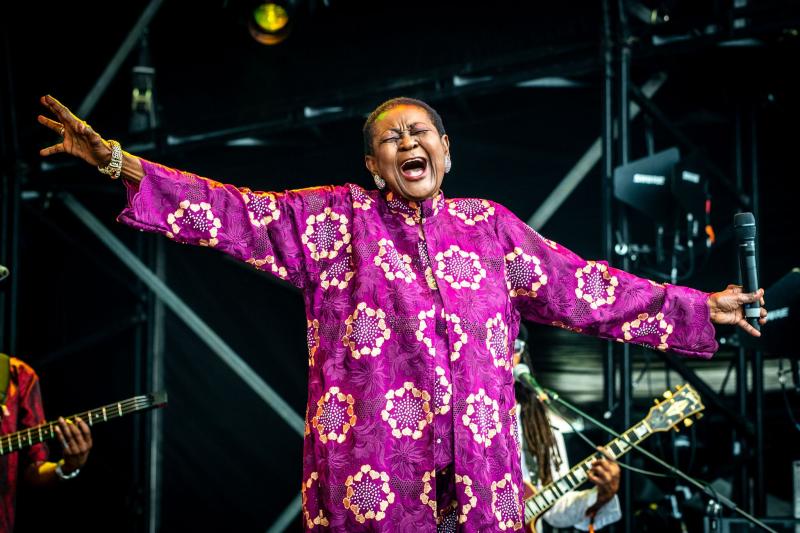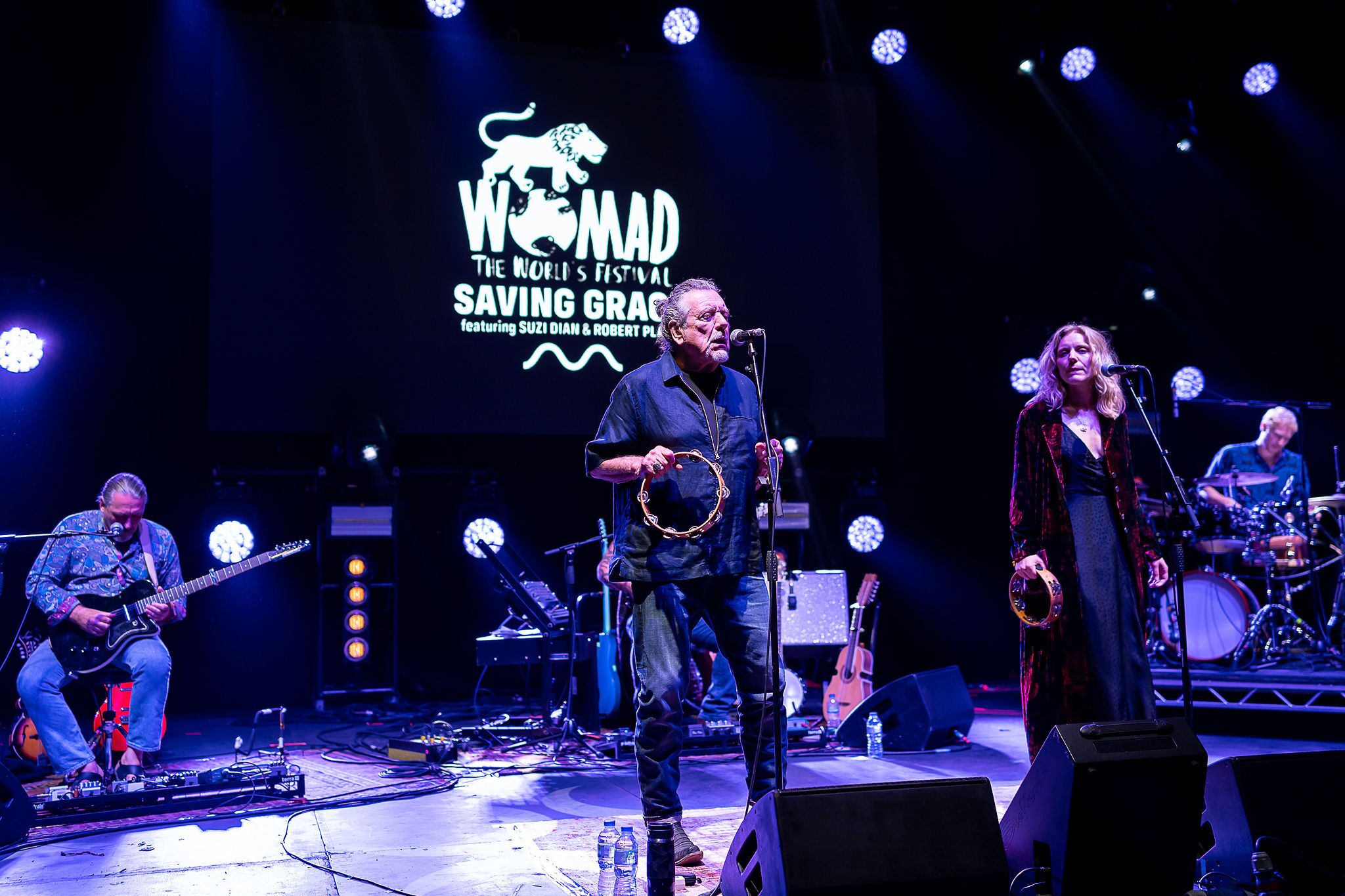WOMAD, Charlton Park review - a gloriously defiant global music celebration | reviews, news & interviews
WOMAD, Charlton Park review - a gloriously defiant global music celebration
WOMAD, Charlton Park review - a gloriously defiant global music celebration
Internationalist grooves from Robert Plant to Calypso Rose

This was a year of superb musical standards, smooth organisation and a real sense of celebration. In the last couple of years, WOMAD being more liberal and internationalist than nearly anywhere else, there was a sense in the air of a collective political shock - maybe the future wasn’t with our tribe of happy cultural globalists after all.
As ever, there were plenty of new and thrilling acts on offer, at least to WOMAD. I’d seen Viveick Rajapolan’s Ta Dhom Project at the world music expo WOMEX, playing to a tough crowd of industry insiders whose basic attitude is “impress me”. This time the crowd were almost immediately won over to the idea of mixing Konnakol, the vocal percussion style that is part of Carnatic South Indian traditions with contemporary rap. With added earthy bass from veteran Shri, the percussion and vocal acrobatics went down a storm.
Orquesta Akokán are the new mambo kings, a big band reviving the kind of delirious sounds of Benny Moré and Perez Prado from the 1940s and 50s. The band’s all-male, old style macho swagger fronted by the charismatic José ‘Pepito’ Gomez was unbelievably tight (maybe a touch too much, they will loosen up a little with road time) and it was a treat to see such an apparently unwieldy retro big band re-inventing the past with grace and pizzazz.
The other Cuban delight was Juan de Marcos’ Afro-Cuban All-Stars. A retro enthusiast for decades (including his first band, the mighty Sierra Maestre) his main musical anchor is the son of the likes of Arsenio Rodriguez and jazz. Juan De Marcos helped change the face of both Cuban music (and according to a Minister of Tourism I met “saving the revolution.”) He was the one who got Ibrahim Ferrer and Ruben Gonzalez out of retirement for the Buena Vista Social Club and was as responsible as anyone for that multi-million selling phenomenon and the hordes of tourists that came after to visit Cuba.
What Juan De Marocs pointed out from the stage was that he was now the same advanced age, 65, that Ibrahim was in in the first version of the Afro-Cuban All Stars twenty or so years ago. Other iterations were perhaps too idiosyncratically jazzy for mass adulation and he slightly lost his audience (their first album was a million-seller). But now, surrounded on stage by a wife and daughters, he has once again gone back to go forward and seemed to have a whale of a time on stage, with some strong new material, notably a newly written song about the Cuban African derived cult of Palo Monte.
Another man with family on stage was the hugely charismatic Olivier Arasta fronting his band Lindigo from Réunion Island in the Indian Ocean. Like Cuba and other island music, there is something often hugely distinctive about a culture that has developing in relative isolation - in this case the percussive Maloya style which was revelatory in its joyful, rhythmic energy, connection with the ancestors and reworking of old creole slave songs. Olivier's ancestry is complex - he has to appease both African and Indian ones.
Other bands had been to WOMAD before, like the hit of a few years back the “ethno-chaos” band from Ukraine Dakha Brakha who remain fascinating and highly original in the way the Ukrainian folk elements mix with other global musics. A curious and enjoyable newish element, perhaps because they have been touring the United States so much is that flavours of doo-wop and soul have been added to their appealing musical mélange. There was so much unmissable music that there was much less time than previous years for exploring all the other elements that make up WOMAD - like the Human Book library where you sign and take out someone who tells you important elements of their life story, or the numerous workshops, gong baths or drumming lessons, not to mention former snooker champion Steve Davis's DJ set at Molly's Bar. A fascinating talk by veteran music and war journalist Robin Denselow managed to seamlessly jump from highly entertaining anecdotes of hanging out with Bob Marley to assorted hair-raising scrapes in conflict zones.
There was so much unmissable music that there was much less time than previous years for exploring all the other elements that make up WOMAD - like the Human Book library where you sign and take out someone who tells you important elements of their life story, or the numerous workshops, gong baths or drumming lessons, not to mention former snooker champion Steve Davis's DJ set at Molly's Bar. A fascinating talk by veteran music and war journalist Robin Denselow managed to seamlessly jump from highly entertaining anecdotes of hanging out with Bob Marley to assorted hair-raising scrapes in conflict zones.
On not the biggest stage, the d&b Soundscape tent (with poor sightlines for much of the audience) the highlight of the last night was Saving Grace, the latest roots experiment from Robert Plant (pictured above), sharing vocal duties with folkist Suzi Dian. Plant's musical centre of gravity seems to be in the 1920s in the Appalachians “some time before Led Zeppelin” as he put it. The fact that he turns down gazillions to reform Led Zep to continue his fruitful quest for new collaborations and new or brilliant re-inventions of old music can only be applauded.
If there was one true star of the festival, it was the feminist activist and Queen of Calypso from Trinidad, the glorious Calypso Rose. Like many stars of WOMAD, the life story she has to get here is extraordinary and often painful, from being brutally raped as a teenager onwards. She finally had a big international hit three years ago with Far From Home, an album gorgeously produced by Belizean producer Ivan Duran and fellow radical Manu Chao. A survivor of more than one heart attack and cancer, when she took the stage her frailty was gone and totally won the audience over often with songs on weighty topics of oppression or domestic abuse, although her song advising women whose men have dumped them for a “floozie” that they should take up with a young boy in revenge was hilarious, and like all her material hugely catchy and well arranged. We could even forgive her going off-stage mid-set (she has to pace herself at 80) when her band did a not-so-exciting jam session. For her Calypso is an art where (and we did) “you should dance, but also listen.”
rating
Explore topics
Share this article
The future of Arts Journalism
You can stop theartsdesk.com closing!
We urgently need financing to survive. Our fundraising drive has thus far raised £49,000 but we need to reach £100,000 or we will be forced to close. Please contribute here: https://gofund.me/c3f6033d
And if you can forward this information to anyone who might assist, we’d be grateful.

Subscribe to theartsdesk.com
Thank you for continuing to read our work on theartsdesk.com. For unlimited access to every article in its entirety, including our archive of more than 15,000 pieces, we're asking for £5 per month or £40 per year. We feel it's a very good deal, and hope you do too.
To take a subscription now simply click here.
And if you're looking for that extra gift for a friend or family member, why not treat them to a theartsdesk.com gift subscription?
more New music
 Album: Rise Against - Ricochet
Have the US punk veterans finally run out of road?
Album: Rise Against - Ricochet
Have the US punk veterans finally run out of road?
 Music Reissues Weekly: The Final Solution - Just Like Gold
Despite their idiotic name, these San Francisco psychedelic pioneers sounded astonishing
Music Reissues Weekly: The Final Solution - Just Like Gold
Despite their idiotic name, these San Francisco psychedelic pioneers sounded astonishing
 Mogwai / Lankum, South Facing Festival review - rich atmospheres in a south London field
Two polished performances and an embarrassment of instruments
Mogwai / Lankum, South Facing Festival review - rich atmospheres in a south London field
Two polished performances and an embarrassment of instruments
 Album: Alison Goldfrapp - Flux
The synth diva in her comfort zone - maybe getting a little too comfortable, though
Album: Alison Goldfrapp - Flux
The synth diva in her comfort zone - maybe getting a little too comfortable, though
 Album: The Black Keys - No Rain, No Flowers
Ohio rockers' 13th album improves on recent material, but still below mainstream peak
Album: The Black Keys - No Rain, No Flowers
Ohio rockers' 13th album improves on recent material, but still below mainstream peak
 Wilderness Festival 2025 review - seriously delirious escapism
A curated collision of highbrow hedonism, surreal silliness and soulful connection
Wilderness Festival 2025 review - seriously delirious escapism
A curated collision of highbrow hedonism, surreal silliness and soulful connection
 Album: Ethel Cain - Willoughby Tucker, I'll Always Love You
Relatively straightforward songs from the Southern Gothic star - with the emphasis on 'relatively'
Album: Ethel Cain - Willoughby Tucker, I'll Always Love You
Relatively straightforward songs from the Southern Gothic star - with the emphasis on 'relatively'
 Album: Black Honey - Soak
South Coast band return with another set of catchy, confident indie-rockin'
Album: Black Honey - Soak
South Coast band return with another set of catchy, confident indie-rockin'
 Album: Molly Tuttle - So Long Little Miss Sunshine
The US bluegrass queen makes a sally into Swift-tinted pop-country stylings
Album: Molly Tuttle - So Long Little Miss Sunshine
The US bluegrass queen makes a sally into Swift-tinted pop-country stylings
 Music Reissues Weekly: Chip Shop Pop - The Sound of Denmark Street 1970-1975
Saint Etienne's Bob Stanley digs into British studio pop from the early Seventies
Music Reissues Weekly: Chip Shop Pop - The Sound of Denmark Street 1970-1975
Saint Etienne's Bob Stanley digs into British studio pop from the early Seventies
 Album: Mansur Brown - Rihla
Jazz-prog scifi mind movies and personal discipline provide a... complex experience
Album: Mansur Brown - Rihla
Jazz-prog scifi mind movies and personal discipline provide a... complex experience
 Album: Reneé Rapp - Bite Me
Second album from a rising US star is a feast of varied, fruity, forthright pop
Album: Reneé Rapp - Bite Me
Second album from a rising US star is a feast of varied, fruity, forthright pop

Add comment